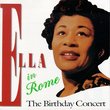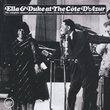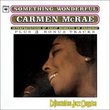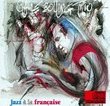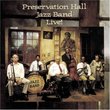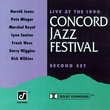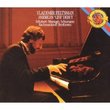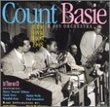| All Artists: Ella Fitzgerald; Billie Holiday; Carmen Mcrae Title: At Newport Live Members Wishing: 1 Total Copies: 0 Label: Verve Original Release Date: 1/1/1957 Re-Release Date: 8/7/2007 Album Type: Live, Original recording remastered Genres: Blues, Jazz, Pop, Broadway & Vocalists Styles: Vocal Blues, Traditional Blues, Swing Jazz, Traditional Jazz & Ragtime, Vocal Jazz, Oldies, Vocal Pop, Traditional Vocal Pop Number of Discs: 1 SwapaCD Credits: 1 UPC: 602517416062 |
Search - Ella Fitzgerald; Billie Holiday; Carmen Mcrae :: At Newport Live
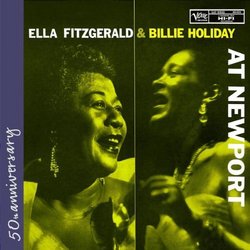 | Ella Fitzgerald; Billie Holiday; Carmen Mcrae At Newport Live Genres: Blues, Jazz, Pop, Broadway & Vocalists
In 1957, the Newport Jazz Festival presented three of the greatest jazz divas on successive nights, with the tape recorders rolling the whole time. Shortly thereafter came the original LP, Ella Fitzgerald & Billie Holi... more » |
Larger Image |
CD Details
Synopsis
Amazon.com
In 1957, the Newport Jazz Festival presented three of the greatest jazz divas on successive nights, with the tape recorders rolling the whole time. Shortly thereafter came the original LP, Ella Fitzgerald & Billie Holiday at Newport. The constraints of vinyl, and the fact that she had not yet achieved the same stature as Holiday and Fitzgerald, kept Carmen McRae out of the picture. So the six previously unreleased McRae selections--along with three new Fitzgerald tracks--somewhat justify the new packaging of this album. But that reason doesn't really suffice. As William Ruhlman points out in his game but candid liner notes, none of the singers comes off very well here. Fitzgerald sings wonderfully, of course--when didn't she?--but her trio falls in and out of synch. Worse, the stage announcer's audible suggestion that she move closer to the microphone results in overmodulated distortion on four-fifths of the set ("Too Close for Comfort," one of the songs she sings here, is all too appropriate). Holiday, in her later years, sang with a reduced vocal range and waning energy, which she sometimes countered with sly sagacity. Here, two years before her death, she offers, alas, only a pallid version of that. Relatively few in-performance recordings of McRae exist from the 1950s, and this one offers a big, eager-to-please voice and plenty of technical fireworks. But McRae sounds almost frighteningly chipper. When she acknowledges applause with improbably bright "thank you"s, she sounds like Alvin the Chipmunk's older sister. Later "live" sets betray none of this nervousness, and you don't have to listen to too-loud Ella and too-tired Billie to get them. --Neil Tesser
Similar CDs
| Ella Fitzgerald First Lady of Song Genres: Jazz, Pop, Broadway & Vocalists Label: Polygram Records | |
Similarly Requested CDs
| Carmen McRae Something Wonderful Genres: Jazz, Pop, Broadway & Vocalists Label: Collectables | |
| Claude Bolling Jazz a La Francaise Genres: Jazz, Pop, Rock, Classical Label: Sony | |
| Count Basie At the Royal Roost Ny 1948 Genres: Blues, Jazz, Pop Label: Drive Archive | |
| Gipsy Kings Cantos De Amor Genres: International Music, Jazz, New Age, Pop, Latin Music Label: Nonesuch | |

 Track Listings (24) - Disc #1
Track Listings (24) - Disc #1
